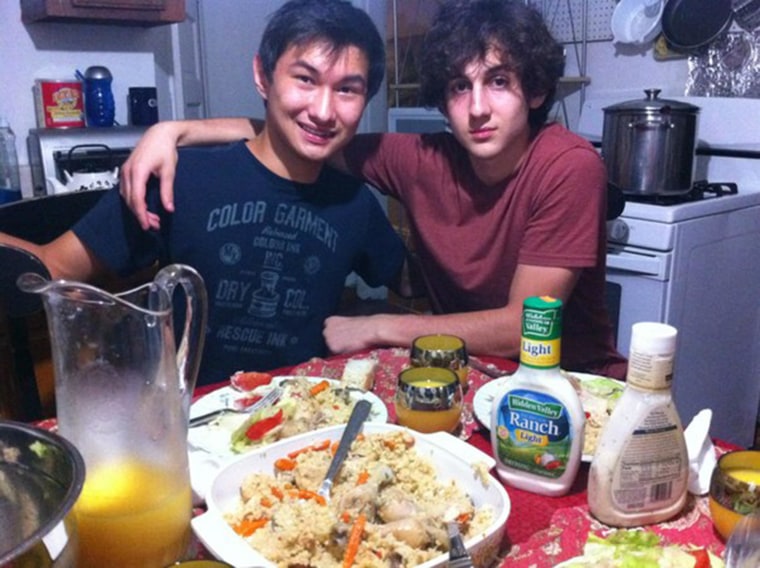Boston Marathon bombing suspect Dzhokhar Tsarnaev sent his mother an e-mail suggesting he expected to die in a confrontation with authorities, prosecutors said in court documents Tuesday.
The email — which ended by saying, "If I don't see you in this life, I will will see you in the akhira," or afterlife — showed that Tsarnaev abandoned his expectation of privacy when he left his older brother's apartment with weapons and bombs three days after the bombings last year, prosecutors said.
That makes an FBI search of the apartment legal, prosecutors contended in documents filed Tuesday in U.S. District Court in Boston (PDF).
Dzhokhar Tsarnaev, 20, could face the death penalty if he's convicted of using a weapon of mass destruction and malicious destruction of property resulting in death for allegedly detonating pressure-cooker bombs near the finish line of the famous race on April 15, 2013.
Tsarnaev's brother, Tamerlan, was killed in a shootout with police on April 18 after he and his brother met at the apartment, "collected a small arsenal of weapons, including at least six bombs, a handgun and other weapons, then embarked on a murderous crime spree," the court filing says.
Dzhokhar Tsarnaev's attorneys want a judge to throw out the search evidence from the Cambridge apartment and of Dzhokhar Tsarnaev's dorm room at the University of Massachusetts-Dartmouth, saying they were illegal invasions of his privacy.
Prosecutors say the search of the apartment were proper, because Dzhokhar Tsarnaev relinquished any claim of privacy over its contents when he moved out in September 2011 and when the FBI circulated a photo of him as a suspect in the bombings.
The e-mail to his mother also showed that "he did not expect to return alive, and this abandoned his expectation of privacy in everything he left behind," prosecutors argued.
"If I don't see you in this life, I will will see you in the akhira."
Prosecutors also detailed other potential evidence they say was found in Tsarnaev's residences, including a Russian dictionary that had handwritten prayer cards tucked into its pages referring to two al Qaeda-linked figures.
The government said one of the prayer cards mentioned Anwar al-Awlaki, the U.S.-born Muslim cleric who was believed to be a senior propagandist and recruiter for al Qaeda before a U.S. drone strike killed him in Yemen in 2011.
The other, it said, referred to Tarek Mehanna, a Massachusetts man who was convicted in 2011 of conspiring to materially assist al Qaeda and plotting to kill U.S. soldiers in Iraq.
The filing came as a friend of Tsarnaev's admitted in court that he suspected that Tsarnaev was involved in the marathon bombings when he went to Tsarnaev's dorm room a few days after the attack.
The man, Dias Kadyrbayev, 20, is accused of removing a laptop and a backpack bearing residue of fireworks after Tsarnaev allegedly sent him a text message asking him to go to the dorm room and "take what's there."

Kadyrbayev, who is from Kazakhstan, testified during a hearing on his lawyers' motion to suppress his statements to investigators. They say he doesn't speak good enough English to have understood his rights or the importance of the documents he was signing last year under interrogation.
Kadyrbayev testified that he was extremely intimidated when local and federal law enforcement agents raided his apartment building on April 19, 2013, handcuffed him and bundled him into the back of a car, The Associated Press reported.
Kadyrbayev said an FBI agent got into the car and began swearing at him.
"He said, kind of like, 'Hey, listen to me, where the [expletive] is Dzhokhar?' and I was like, 'I don't know, man, I don't know,'" Kadyrbayev said.
U.S. District Judge Douglas Woodlock didn't rule on the motion to suppress, saying he would allow prosecutors and Kadyrbayev's lawyer to submit written briefs and make oral arguments in August.